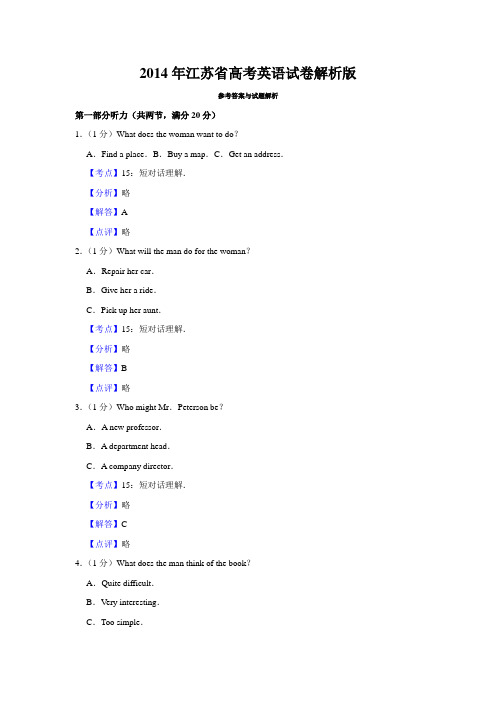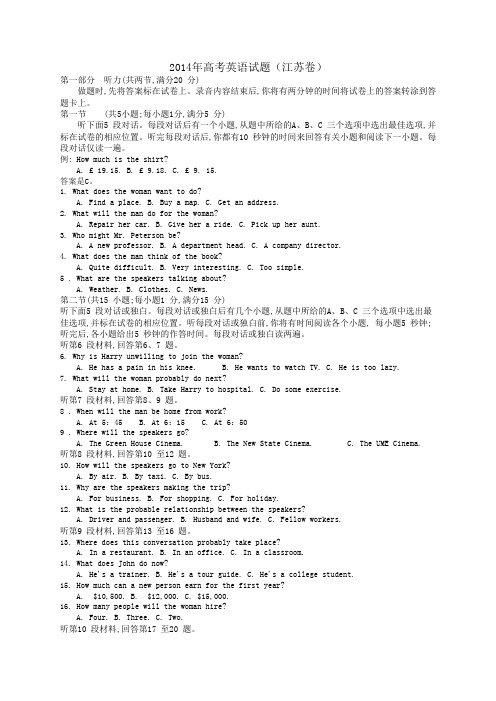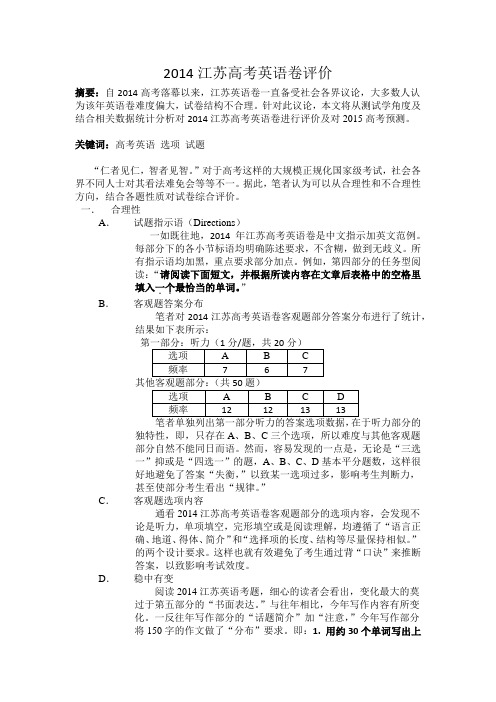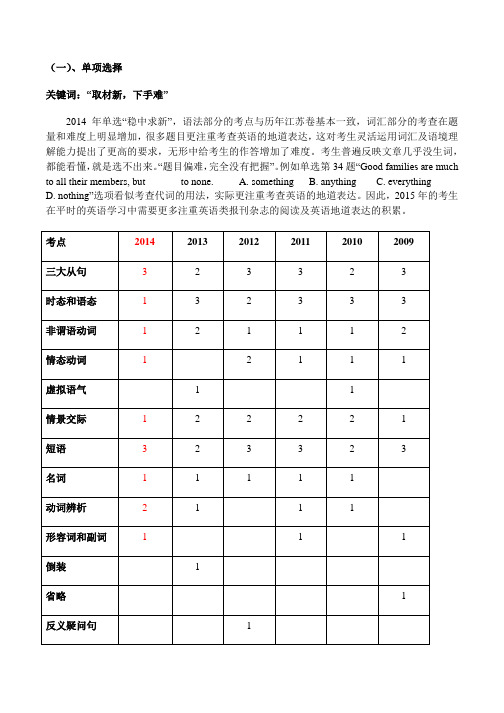2014高考英语江苏卷评析
2014年高考英语江苏卷点评

2014年高考英语江苏卷点评作者:熊春草等来源:《新东方英语·中学版》2015年第05期2014年高考英语江苏卷整体难度适中,知识点覆盖全面,难、中、易试题分布较为合理,体现“稳中有变、变中求新”的原则。
试题选材丰富,贴近生活与社会热点。
词汇难度稍有下降,偏词、怪词、难词少,但阅读理解篇幅变长,对考生快速阅读和临场发挥能力提出了更高的要求。
下面我们分题型逐一讲解。
(编注:2014年江苏卷同福建卷一样,听力部分都采用了新课标I卷的听力,本刊2015年3月号P30刊登过其点评,因此本文不再对听力进行点评。
)单项选择整体点评相较于2013年的试题,2014年高考英语江苏卷的单项选择部分呈现出的最大特点是题干变短。
由于题干变短导致信息量减少,题目难度反而增加了。
据统计,2014年高考英语江苏卷单选题的题干词数是2011年以来最少的一年,可谓变化很大。
和往年相比,2014年单选部分的考查范围变化不大,考点涉及从句(21、22、26)、非谓语动词(28、29)、时态(23)、代词(34)、名词(27)、介词短语(24)、动词及短语辨析(25、30、31、33)、副词(32)、情景交际(35)等。
此外,有些题目选取的话题比往年更贴近生活。
考题特点1. 考查基本词汇语法部分题目考查考生对基本英语词汇和语法知识点的掌握,具有较为典型的高考题目特色。
例如第24题:Tom always goes jogging in the morning and he usually does push-ups too to stay .A. in placeB. in orderC. in shapeD. in fashion【解析】从四个选项中可以看出,此题考查的是与介词in相关的四个短语辨析,难度不大。
题干句意为:汤姆早晨总是去慢跑,他也经常做俯卧撑,为了保持。
A项意为“在合适的位置;安排有序的”,B项意为“井然有序”,C项意为“良好体形”,D项意为“流行”。
2014年江苏省高考英语试卷解析版

2014年江苏省高考英语试卷解析版参考答案与试题解析第一部分听力(共两节,满分20分)1.(1分)What does the woman want to do?A.Find a place.B.Buy a map.C.Get an address.【考点】15:短对话理解.【分析】略【解答】A【点评】略2.(1分)What will the man do for the woman?A.Repair her car.B.Give her a ride.C.Pick up her aunt.【考点】15:短对话理解.【分析】略【解答】B【点评】略3.(1分)Who might Mr.Peterson be?A.A new professor.B.A department head.C.A company director.【考点】15:短对话理解.【分析】略【解答】C【点评】略4.(1分)What does the man think of the book?A.Quite difficult.B.Very interesting.C.Too simple.【考点】15:短对话理解.【分析】略【解答】B【点评】略5.(1分)What are the speakers talking about?A.Weather.B.Clothes.C.News.【考点】15:短对话理解.【分析】略【解答】A【点评】略6.(2分)听第6段材料,回答6、7题.6.Why is Harry unwilling to join the woman?A.He has a pain in his knee.B.He wants to watch TV.C.He is too lazy.7.What will the woman probably do next?A.Stay at home.B.Take Harry to hospital.C.Do some exercise.【考点】16:长对话理解.【分析】略【解答】B C【点评】略7.(2分)听第7段材料,回答第8、9题.8.When will the man be home from work?A.At 5:45.B.At 6:15.C.At 6:50.9.Where will the speakers go?A.The Green House Cinema.B.The New State Cinema.C.The UME Cinema.【考点】16:长对话理解.【分析】略【解答】AC【点评】略8.(3分)听第8段材料,回答第10至12题.10.How will the speakers go to New York?A.By air.B.By taxi.C.By bus.11.Why are the speakers making the trip?A.For business.B.For shopping.C.For hoilday.12.What is the probable relationship between the speakers?A.Driver and passenger.B.Husband and wife.C.Fellow workers.【考点】16:长对话理解.【分析】略【解答】AAC【点评】略9.(4分)(1)Where does this conversation probably take place?A.In a restaurant.B.In an office.C.In a classroom.(2)What does John do now?A.He's a trainer.B.He's a tour guide.C.He's a college student.(3)How much can a new person earn for the first year?A.﹩10,500.B.﹩12,000.C.﹩15,000.(4)How many people will the woman hire?A.Four.B.Three.C.Two.【考点】16:长对话理解.【分析】略【解答】BCAC【点评】略10.(4分)听第10段材料,回答第17至20题.17.How long has the speaker lived in a big city?A.One year.B.Ten years.C.Eighteen years.18.What is the speaker's opinion on public transport?A.It's comfortable.B.It's time﹣saving.C.It's cheap.19.What is good about living in a small town?A.It's safer.B.It's healthier.C.It's more convenient.20.What kind of life does the speaker seem to like most?A.Busy.B.Colourful.C.Quiet.【考点】17:短文理解.【分析】略【解答】略【点评】略第二部分:英语知识运用(共两节,满分15分)第一节:单项填空(共15小题;每小题1分,满分15分)请阅读下面各题,从题中所给的A、B、C、D四个选项中,选出最佳选项,并在答题卡上将该项涂黑.11.(1分)Lessons can be learned to face the future,________ history cannot be changed.()A.though B.as C.since D.unless【考点】92:从属连词.【分析】尽管历史无法改变,但是学习过去的经验可以(更好地)面对未来,.【解答】答案:Athough尽管;as因为;since因为;unless除非.题干表示的是转折的含义,意为"即使",要用表示让步关系的连词though/although.故选A.【点评】连词是用来连接复合句的,类型较多,用法灵活.平时学习时,要注意区分和掌握.12.(1分)The book has helped me greatly in my daily communication,especially at work ________ a good impression is a must.()A.where B.when C.as D.which【考点】7A:关系副词;H1:限制性定语从句.【分析】这本书在日常交际中极大地帮助了我,尤其是在第一印象至关重要的工作中.【解答】答案:A分析句子结构可知,"especially at work ________ a good impression is a must"是定语从句,work是先行词,"________ a good impression is a must"是从句部分;将先行词放到从句中:"a good impression is a must at work"其中"at work"作地点状语,所以要用关系副词where.关系副词when在定语从句中作时间状语;as,which 作为关系代词,不能作状语,所以B.C.D都不正确.故选:A.【点评】本题考查的是定语从句中关系副词的用法.解题的突破口是对句子成分的正确分析,例如:当从句部分有主语和宾语时,就可以排除关系代词,而选择可用作状语的关系副词.13.(1分)﹣How much do you know about the Youth Olympic Games to be held in Nanjing?﹣Well,the media ________ it in a variety of forms.()A.cover B.will coverC.have covered D.covered【考点】E8:现在完成时.【分析】﹣﹣关于将在南京举办的青奥会你了解多少?﹣﹣嗯,媒体已经用各种形式进行了报道.【解答】答案:C根据句意"媒体已经用各种形式进行了报道."可以判定出,本题用现在完成时态,强调过去的事情对现在的影响还存在.故选:C.【点评】考查时态时,句中如果没有明显的时间状语,就需要考生认真分析句意,从语境、上下文中推断句子所需要的时态.14.(1分)Tom always goes jogging in the morning and he usually does push﹣ups too to stay ________.()A.in place B.in order C.in shape D.in fashion【考点】8B:介词短语.【分析】为了保持身材(有形),每天早晨Tom总去慢跑,也经常做引体向上.【解答】答案C.A项"有序,在适当的位置";B项"井井有条";D项"流行的,时尚的";C项"身材有形;健康的,状态良好的";根据句意可知,Tom锻炼的目的是为了保持好身材.故选C.【点评】本题考查介词短语辨析.解答此类题目首先要读懂句意,然后根据上下文语境锁定合适的介词短语.平时学习中要加强介词短语的积累.15.(1分)Top graduates from universities are ________ by major companies.()A.chased B.registeredC.offered D.compensated【考点】AE:动词的辨析.【分析】优秀大学毕业生受到大公司的追捧.【解答】答案:A chase追逐,追求;register注册,登记;offer提供;compensate补偿.句意表达的是受到大公司的欢迎和追捧,故选A.【点评】动词短语是一个比较难的语言点,搭配较多,用法灵活.学习时,要注意积累.尤其是相似或相近的用法,要注意区分和掌握.16.(1分)﹣What a mess!You are always so lazy!﹣I'm not to blame,mum.I am ________ you have made me.()A.how B.what C.that D.who【考点】58:连接代词;HD:表语从句.【分析】﹣﹣怎么这么乱啊!你总是这么懒.!﹣﹣我不应该受到责备,妈妈.我今天这个样子都是你造成的.【解答】答案:B解答名词性从句时,如果从句中缺少主宾表语时,一般选择what.如果指人,则用who,但考虑本题从句中_____you have made me缺少me的宾语补足语,而且句意指的是妈妈使他成为那个样子,所以B正确.【点评】考查此类试题,要分析从句缺少什么成分,其次要注意一些特殊的语境,比如用what指代人,表示人的状态或职业.17.(1分)She was put under house arrest two years ago but remained a powerful ________ in last year's election.()A.symbol B.portrait C.identity D.statue【考点】35:名词的词义辨析.【分析】两年前她就遭软禁,但她在去年的选举中仍然是代表人物.【解答】A本题考查词意辨析.A.symbol符号;象征;标志;B.portrait肖像;画像;描写C.identity 一致;身份;特征D.statue雕像;塑像.故选A.【点评】名词辨析考查的是词意理解,平时学习时要注意积累.18.(1分)The idea"happiness,"________,will not sit still for easy definition.()A.to be rigid B.to be sureC.to be perfect D.to be fair【考点】64:形容词词意辨析.【分析】"幸福"的观念,可以肯定的是,决不意味着轻而易举,一蹴而就.【解答】答案:BA.to be rigid 硬性的;B.to be sure 可以肯定的是;C.to be perfect十全十美地;D.to be fair 公平地说;此处是插入语,结合前后的句意可知,to be sure 符合句意;故选B 【点评】本题考查了形容词词意辨析.做本题的关键是在理解题意的基础上,正确辨析各选项的意思,从而选出答案;这就需要平时应熟练掌握一些形容词及其短语的意义及用法.19.(1分)The lecture ________,a lively question﹣and﹣answer session followed.()A.being given B.having givenC.to be given D.having been given【考点】B1:现在分词的被动式;B2:现在分词的完成式.【分析】演讲完成后有一个生动的问答板块.【解答】答案:D题干中give是作lecture的后置定语,两者构成动宾关系,要用被动;句意表达的give 动作发生在follow之前,要用分词的完成式.故选D.【点评】现在分词是非谓语动词的一种,表达主动或进行;过去分词表达被动或完成;动词不定式表达未发生的动作.学习时,要注意区分和掌握.20.(1分)﹣Dad,I don't think Oliver the right sort of person for the job.﹣I see.I'll go right away and ________.()A.pay him back B.pay him offC.put him away D.put him off【考点】A9:动词短语.【分析】﹣﹣﹣爸爸,我认为Oliver不是这份工作的合适人选.﹣﹣﹣我知道,我马上去拿钱打发了他.【解答】答案:BA.pay him back 报复他,偿还他的钱;B.pay him off 拿钱打发了他,为他做出补偿;C.put him away 把他送进监狱,把他关起来;D.put him off 使他分心;根据语境Oliver 不是这份工作的合适人选可知,此处的意思应是给他结清工资并解聘他;故选B【点评】本题考查的是动词短语的用法.做本题时,需要明确各选项中动词短语的意思,然后在理解句意的基础上,找出正确答案;因此在平时的学习中,应注意积累一定的词汇及动词短语,并且要牢记它们的意义.21.(1分)It was sad to me that they,so poor themselves,________ bring me food.()A.might B.would C.should D.could【考点】A6:情态动词.【分析】让我感到难过的是,他们自己那么穷,竟然还给我带吃的.【解答】答案:C分析句意可知,此处表达的意思应是:他们自己那么穷,竟然还给我带吃的;A.可能,可以;B.愿意,会;C.表示惊讶:竟然;D.能,可能;故选:C.【点评】本题考查了情态动词should(表示惊讶,意为:竟然,居然会)的用法.作此类题时,需要熟练掌握各情态动词所具有的意义及用法.22.(1分)I can't meet you on Sunday.I'll be ________ occupied.()A.also B.justC.nevertheless D.otherwise【考点】7B:副词辨析.【分析】周日我不能和你见面,否则我将没空了.【解答】答案:DA.also 同样,也;B.just仅仅,只是;C.nevertheless 然而,尽管如此;D.otherwise 否则,另外;句中occupied意为:无空闲的;分析句意可知,此处表达的是转折的意思,故选D【点评】本题考查了副词词义辨析.做本题时,应首先理解句意,弄清句子之间的意义关系;其次应熟练掌握各副词的意义及用法.23.(1分)Legend has it that the origin of the Dragon Boat Festival is to ________ the soul of Qu Yuan.()A.remember B.remind C.recover D.recall【考点】AE:动词的辨析.【分析】关于龙舟节的起源,传说是为了纪念屈原的亡灵.【解答】答案:D remember记住;remind提醒;recover康复;recall回忆,想起.句意表达的是为了让人们想起,故选D.【点评】动词短语是一个比较难的语言点,搭配较多,用法灵活.学习时,要注意积累.尤其是相似或相近的用法,要注意区分和掌握.24.(1分)Good families are much to all their members,but ________ to none.()A.something B.anything C.everything D.nothing【考点】54:不定代词.【分析】句意为:好的家庭对它所有的成员来说都非常重要,但不是任何人的全部.【解答】答案:Ceverything意为"一切,全部",符合语境.something某事;anything任何事;nothing 什么都没有,这三个选项不符句意.句中的none是指代人(家庭成员),是否定词,也就是"没有家庭成员",意思是好的家庭不是家庭成员的全部.故本题选择C.【点评】考查不定代词,要了解不同的不定代词在语境中的含义.25.(1分)﹣________!Somebody has left the lab door open.﹣Don't look at me.()A.Dear me B.Hi,thereC.Thank goodness D.Come on【考点】JI:语言交际.【分析】﹣﹣哎呀!有人离开实验室门还开着.﹣﹣不要看着我(不是我干的).【解答】答案A.B项"嗨";C项"谢天谢地";D项"加油";A项"哎呀(表示惊讶)";根据上下文的语境可知,前者对于实验室的门还开着很惊讶.因此A项符合语境,故选A.【点评】本题考查情景交际.解答此类题目首先应该读懂句意,分析上下文语境和逻辑关系.其次对每个选项中的交际用语的适用情况要掌握,根据语境锁定正确答案.关键平时学习中要对交际用语多积累多总结反复记忆.第二节:完形填空(共1小题;每小题20分,满分20分)请阅读下面短文,从短文后各题所给的A、B、C、D四个选项中,选出最佳选项,并在答题卡上将该项涂黑.26.(20分)Dale Carnegie rose from the unknown of a Missouri farm to international fame because he found a way to fill a universal human need.It was a need that he first (36)D back in 1906when young Dale was a junior at State Teachers College in Warrensburg.To get an (37)B,he was struggling against many difficulties.His family was poor.His Dad couldn't afford the(38)B at college,so Dale had to ride horseback 12miles to attend classes.Study had to be done (39)A his farm ﹣work routines.He withdrew from many school activities(40)C he didn't have the time or the (41)D.He had only one good suit.He tried(42)B the football team,but the coach turned him down for being too (43)A.During this period Dale was slowly (44)C an inferiority complex (自卑感),which his mother knew could (45)A him from achieving his real potential.She(46)A that Dale join the debating team,believing that (47)B in speaking could give him the confidence and recognition that he needed.Dale took his mother's advice,tried desperately and after several attempts(48)C made it.This proved to be a(49)D point in his life.Speaking before groups did help him gainthe(50)D he needed.By the time Dale was a senior,he had won every top honor in (51)C.Now other students we re coming to him for coaching and they,(52)C,were winning contests.Out of this early struggle to (53)B his feelings of inferiority,Dale came to understand that the ability to (54)A an idea to an audience builds a person's confidence.And,(55)D it,Dale knew he could do anything he wanted to do﹣and so could others.36.A.admitted B.filled C.supplied D.recognized 37.A.assignment B.education C.advantage D.instruction 38.A.training B.board C.teaching D.equipment 39.A.between B.during C.over D.through 40.A.while B.when C.because D.though 41.A.permits B.interest C.talent D.clothes 42.A.on B.for C.in D.with 43.A.light B.flexible C.optimistic D.outgoing 44.A.gaining B.achieving C.developing D.obtaining 45.A.prevent B.protect C.save D.free 46.A.suggested B.demanded C.required D.insisted 47.A.presence B.practice C.patience D.potential 48.A.hopefully B.certainly C.finally D.naturally 49.A.key B.breaking C.basic D.turning 50.A.progress B.experience C.competence D.confidence 51.A.horse﹣riding B.football C.speech D.farming 52.A.in return B.in brief C.in turn D.in fact 53.A.convey B.overcome C.understand D.build 54.A.express B.stress C.contribute D.repeat 55.A.besides B.beyond C.like D.with【考点】M6:人生感悟类阅读.【分析】本文是一篇记叙文.主要讲述了Dale Carnegie (戴尔•卡耐基)从不为人所知,到享有国际声誉的成功故事.他年轻时因为家里穷不得不每天往返12英里求学.后来他听从母亲的建议,学习演讲,从而获得自信,最终成为成功的演说家.文章旨在告诉我们自信心的重要性,有了自信,我们就可以做到我们想做的任何事情.【解答】36.D考查动词辨析.根据第二段最后一句"…recognition that he needed"和第一段中的"…he found…a universal human need."可知,戴尔意识到了自己的所需.recognize"识别,意识到",符合语境.故选D.37.B考查名词辨析.根据上句中的"when young Dale was a junior at State Teachers College in Warrensburg"可知,为了获得教育,他经历了很多困难.故选B.38.B考查名词辨析.根据第二段第二、四句"…against many difficulties.His family waspoor…had to ride horseback 12 miles to attendclasses."可知,他不得不骑着马上学,并且家里很穷,故可以判断,他的父亲无法为他支付膳宿费.board意为"膳宿,董事会,甲板",符合语境.故选B.39.A考查介词辨析.根据后文"his farm﹣work routines"及"withdrew from many school activities"和"he didn't have the time"可知,他做农活和没时间参加许多学校活动,他应该是在农活间隙中学习.between意为"在…之间",符合语境.故选A.40.C考查连词辨析.根据第二段第三行中的"He withdrew from many school activities…",可知,学校的许多活动他没有参加,应该是说明不参加的原因.所以用because引导原因状语从句.故选C.41.D考查名词辨析.根据后面一句"He had only one goodsuit."可知,他没有好衣服.clothes意为"衣服",符合语境.故选D.42.B考查介词辨析.他想争取参加足球队,但是被教练拒绝."try for"为固定搭配,意为"争取,谋求",符合语境.try on 试穿;try in 把…放进去;try with 用…尝试.故选B.43.A考查形容词辨析.根据第二段第二行中的"His family was poor",可知,他因为贫穷,生活艰苦,长得比较瘦弱.故选A项.44.C考查动词辨析.根据语境可知,在那一段时期,因为太瘦弱,足球教练拒绝了他,并且不怎么参加学校活动,Dale 慢慢地形成了自卑感.develop意为"养成,形成",符合语境.故选C.45.A考查动词辨析.根据句意可知,他的妈妈知道,这种自卑感将阻止他发挥他真正的潜能."prevent sb fromdoing sth"为固定搭配,意为"阻止某人做某事",故选A.46.A考查动词辨析.根据第三段中的第一句"Dale took hismother's advice…"及语境可知,他的妈妈建议他参加辩论队,认为辩论队里的演讲的练习会给与他所需要的认可和信心."suggest"表示"建议"时后接从句,从句为虚拟语气,用"should+动词原形",故选A 项.47.B考查名词辨析.根据下文的语境可知,戴尔获得荣誉,一定是自己反复练习的缘故."practice 训练,实践",符合语境.故选B.48.C考查副词辨析.根据"tried desperately and after several attempts"及后文"he had won every top honor"可知,他不顾一切地反复尝试,他最后终于成功了.finally意为"最后,终于",符合语境.故选C.49.D考查名词辨析.根据第二段的内容"Dale形成自卑"以及第三段中"made it 他成功了"可知,这是他人生的"转折点"."turning"意为"转折",符合语境.故选D.50.D考查名词辨析.根据"speaking could give him the confidence and recognition that he needed"可知,在众人面前演讲确实能帮助他获得他所需要的自信."confidence"意为"自信",符合语境.故选D.51.C考查名词辨析.根据第三段中的"Speaking before groups…"可知,他在演讲中获奖了.speech意为"演讲",符合语境.故选C.52.C考查介词短语辨析.根据语境可知,现在,其他学生过来找他培训,他们也一个一个地赢得比赛."inturn"意为"依次,轮流",符合语境."in return"作为报答;"in brief"简明地;"in fact"事实上.故选C.53.B考查动词辨析.根据第二、三段内容可知,戴尔通过参加演讲克服了自己的自卑感,找到了自信."overcome"意为"克服",符合语境.故选B.54.A考查动词辨析.根据第三段中戴尔参加演讲比赛的叙述可知,戴尔逐渐认识到他有能力在听众面前表达思想.express意为"表达",符合语境.故选A.55.D考查介词辨析.根据语境可知,带着这种自信,Dale知道他能够做他想要做的任何事,别人也是如此.with意为"带着",符合句意.故选D项.【点评】解答此类题目可遵循以下步骤:第一步,通读全文,了解文章大意,获得整体印象,同时初选出一批较有把握的答案.第二步,边核对初选答案边补填留下的空格.如果短文难度较大,则可复读几遍,核对和确定答案.有些空一时决定不了,可作个记号,待复查时再确定.第三步,复查定稿.从整体理解角度出发,仔细审核答案,确保意义上、语法上没有错误,同时对遗留下来的少数几个空格作最后选择.第三部分:阅读理解(共4小题;每小题4分,满分30分)请阅读下列短文,从短文后各题所给的A、B、C、D四个选项中,选出最佳选项,并在答题卡上将该项涂黑.27.(4分)56.Why did the BeauxArts style attract American entrepreneurs A?A.It helped display their money status.B.It was created by famous architects.C.It was named after a famous institute.D.It represented the 19th century urban culture.57.What is unique of SieMatic BeauxArts C?A.Its designs are anti﹣conventional.B.Its designs come from famous structures.C.Its customers can enjoy their own composition.D.Its customers can choose from various new styles.【考点】O7:政治经济类阅读.【分析】本文是一则广告.文章主要介绍了SieMatic Beaux﹣Arts系列厨房的设计风格、设计的由来以及它吸引顾客的独特之处:顾客可以按自己的喜好进行装饰布置,也可加入自己的创新,从而可以分享到自己的成果.【解答】56.A 细节理解题.根据第二段第一句"Back then,a Generation of successful American Entrepreneurs dreamt of a new style of Architecture to express their personal wealth"可知,一代成功的美国企业家梦想着一种新的建筑风格能够表达他们个人财富,也就是说能够显示他们有钱,展示他们的金钱地位.故选A.57.C 推理判断题.根据第三段最后一句"you too can break the conventional rules of style and create something new:your own personal composition of your kitchen.For that,SieMatic BeauxArts offers unique opportunities:A broad range of seemingly conflicting features that you combine to a harmonious design of your own."可知,你也可以打破传统的风格规则,创造一些新的东西,按自己的喜好进行装饰布置,所以SieMatic BeauxArts让顾客有机会显示自己的构思,从而可以分享到自己的成果.故选C.【点评】本文是政治经济类阅读,主要考查学生对细节的理解能力,做题时一定要找到文章中的原句,和题干进行比较,再做出正确选择.28.(6分)However wealthy we may be,we can never find enough hours in the day to do everything we want.Economics deals with this problem through the concept of opportunity cost,which simply refers to whether someone's time or money could be better spent on something else.Every hour of our time has a value.For every hour we work at one job we could quite easily be doing another,or be sleeping or watching a film.Each of these options has a differentopportunity cost﹣namely,what they cost us in missed opportunities.Say you intend to watch a football match but the tickets are expensive and it will take you a couple of hours to get to and from the stadium.Why not,you might reason,watch the game from home and use the leftover money and time to have dinner with friends?This﹣the alternative use of your cash and time﹣is the opportunity cost.For economists,every decision is made by knowledge of what one must forgo﹣in terms of money and enjoyment﹣in order to take it up.By knowing precisely what you are receiving and what you are missing out on,you ought to be able to make better﹣informed,more reasonable decisions.Consider that most famous economic rule of all:there's no such thing as a free lunch.Even if someone offers to take you out to lunch for free,the time you will spend in the restaurant still costs you something in terms of forgone opportunities.Some people find the idea of opportunity cost extremely discouraging:imagine spending your entire life calculating whether your time would be better spent elsewhere doing something more profitable or enjoyable.Yet,in a sense it's human nature to do precisely that﹣we assess the advantages and disadvantages of decisions all the time.In the business world,a popular phrase is"value for money."People want their cash to go as far as possible.However,another is fast obtaining an advantage:"value for time."The biggest restriction on our resources is the number of hours we can devote to something,so we look to maximize the return we get on our investment of time.By reading this passage you are giving over a bit of your time which could be spent doing other activities,such as sleeping and eating.In return,however,this passage will help you to think like an economist,closely considering the opportunity cost of each of your decisions.58.According to the passage,the concept of"opportunity cost"is applied to D.A.making more moneyB.taking more opportunitiesC.reducing missed opportunitiesD.weighing the choice of opportunities59.The"leftover…time"in Paragraph 3probably refers to the time C.A.spared for watching the match at homeB.taken to have dinner with friendsC.spent on the way to and from the matchD.saved from not going to watch the match60.What are forgone opportunities B?A.Opportunities you forget in decision﹣making.B.Opportunities you give up for better ones.C.Opportunities you miss accidentally.D.Opportunities you make up for.【考点】O7:政治经济类阅读.【分析】本文是一篇议论文.文章主要介绍了如何更好地支配自己的时间和金钱,以及如何在作决定时考虑花费的机会成本.因为无论我们多么富有,我们也不可能在一天里找到足够的时间做我们想要做的一切.因此,我们要放弃一些事情选择做更好的事情.【解答】58.D 推理判断题.根据第一段的"Economics deals with this problem through the concept of opportunity cost,which simply refers to whether someone's time or money could be better spent on something else".和第三段的"This﹣the alternative use of your cash and time ﹣is the opportunity cost"可知,opportunity cost(机会成本)是指人们考虑自己的时间和金钱是否可以更好地被利用在其他的事情上,也就是在衡量自己的选择是否合理.所以这个概念应用于衡量机会的选择方面,故选D.59.C 词义推测题.根据第三段的"Say…but the tickets are expensive and it will take you a couple of hours to get to and from the stadium…use the leftover money and time to have dinner with friends?"可知,人们本来是想去看球赛,但是球赛的票太贵了.所以就把本来准备看球赛的金钱和时间用在了别的地方,所以leftover …time所指的是"花在观看比赛(路上)来去的时间".故选C.60.B 推理判断题.根据第四段的"Even if someone offers to take you out to lunch for free,the time you will spend in the restaurant still costs you something in terms of forgone opportunities."可知,即使有人带你去享受免费的午餐,在这种情况下,你吃饭的时间还是会让你失去某些东西.所以推测出forgone opportunities是指"所放弃的可以做更有价值事情的更好的机会".故B正确.【点评】本文是政治经济类阅读,考查学生对细节的理解把握和推理判断能力,做题时一定要找到文章中的原句,和题干进行比较,再做出正确选择.在做推理判断题时不要以个人的主观想象代替文章的事实,要根据文章事实进行合乎逻辑的推理判断.29.(8分)Most damagingly,anger weakens a person's ability to think clearly and keep control over his behaviour.The angry person loses objectivity in evaluating the emotional significance of the person or situation that arouses his anger.Not everyone experiences anger in the same way;what angers one person may amuse another.The specific expression of anger also differs from person to person based on biological and cultural forces.In contemporary culture,physical expressions of anger are generally considered too socially harmful to be tolerated.We no longer regard duels (决斗)as an appropriate expression of anger resulting from one person's awareness of insulting behaviour on the part of another.Anger can be identified in the brain,where the electrical activity changes.Under most conditions EEG (脑电图)measures of electrical activity show balanced activity between the right and left prefrontal (额叶前部)areas.Behaviourally this corresponds to the general even ﹣handed disposition (意向)that most of us possess most of the time.But when we are angry the EEG of the right and left prefrontal areas aren't balanced and,as a result of this,we're likely to react.And our behavioural response to anger is different from our response to other emotions,whether positive or negative.Most positive emotions are associated with approach behaviour:we move closer to people we like.Most negative emotions,in contrast,are associated with avoidance behaviour:we move away from people and things that we dislike or that make us anxious.But anger is an exception to this pattern.The angrier we are,the more likely we are to move towards the object of our anger.This corresponds to what psychologists refer to as of ensive anger:the angry person moves closer in order to influence and control the person or situation causing his anger.This approach﹣and﹣confront behaviour is accompanied by a leftward prefrontal asymmetry (不对称)of EEG activity.Interestingly,this asymmetry lessens if the angry person can experience empathy (同感)towards the individual who is bringing forth the angry response.In defensive anger,in contrast,the EEG asymmetry is directed to the right and the angry person feels helpless in the face of the anger﹣inspiring situation.61.The"duels"example in Paragraph 2proves that the expression of anger C.A.usually has a biological basisB.varies among peopleC.is socially and culturally shapedD.influences one's thinking and evaluation62.What changes can be found in an angry brain B?A.Balanced electrical activity can be spotted.B.Unbalanced patterns are found in prefrontal areas.C.Electrical activity corresponds to one's behaviour.D.Electrical activity agrees with one's disposition.63.Which of the following is typical of offensive anger A?A.Approaching the source of anger.B.Trying to control what is disliked.C.Moving away from what is disliked.D.Feeling helpless in the face of anger.64.What is the key message of the last paragraph D?A.How anger differs from other emotions.B.How anger relates to other emotions.C.Behavioural responses to anger.D.Behavioural patterns of anger.【考点】O5:科教类阅读.【分析】本文是一篇说明文,主要介绍了一些与愤怒有关的表现以及医学原理和人们生气的时候表现出的行为模式.【解答】61.C 推理判断题.根据文章第二段"In contemporary culture,physical expressions of anger are generally considered too socially harmful to be tolerated."在当代社会里,愤怒的肢体表现被认为是对社会有伤害而不能被容忍.但是在古代却又着决斗这样的行为,说明愤怒的表现形式是由不同的社会和文化形成的.故C正确.62.B 细节理解题.根据第三段3,4行"But when we are angry the EEG of the right and left prefrontal areas aren't balanced"可知,当我们生气的时候,脑电图在额叶前部会出现不平衡的现象.故B正确.63.A 细节理解题.根据文章第四段3,4,5行"The angrier we are.the more likely we。
2014年江苏英语高考试卷含答案和解析

2014年高考英语试题(江苏卷)第一部分听力(共两节,满分20 分)做题时,先将答案标在试卷上。
录音内容结束后,你将有两分钟的时间将试卷上的答案转涂到答题卡上。
第一节 (共5小题;每小题1分,满分5 分)听下面5 段对话。
每段对话后有一个小题,从题中所给的A、B、C 三个选项中选出最佳选项,并标在试卷的相应位置。
听完每段对话后,你都有10 秒钟的时间来回答有关小题和阅读下一小题。
每段对话仅读一遍。
例: How much is the shirt?A. £ 19.15.B. £ 9.18.C. £ 9. 15.答案是C。
1. What does the woman want to do?A. Find a place.B. Buy a map.C. Get an address.2. What will the man do for the woman?A. Repair her car.B. Give her a ride.C. Pick up her aunt.3. Who might Mr. Peterson be?A. A new professor.B. A department head.C. A company director.4. What does the man think of the book?A. Quite difficult.B. Very interesting.C. Too simple.5 . What are the speakers talking about?A. Weather.B. Clothes.C. News.第二节(共15 小题;每小题1 分,满分15 分)听下面5 段对话或独白。
每段对话或独白后有几个小题,从题中所给的A、B、C 三个选项中选出最佳选项,并标在试卷的相应位置。
听每段对话或独白前,你将有时间阅读各个小题, 每小题5 秒钟;听完后,各小题给出5 秒钟的作答时间。
2014江苏高考英语卷评价

2014江苏高考英语卷评价摘要:自2014高考落幕以来,江苏英语卷一直备受社会各界议论,大多数人认为该年英语卷难度偏大,试卷结构不合理。
针对此议论,本文将从测试学角度及结合相关数据统计分析对2014江苏高考英语卷进行评价及对2015高考预测。
关键词:高考英语选项试题“仁者见仁,智者见智。
”对于高考这样的大规模正规化国家级考试,社会各界不同人士对其看法难免会等等不一。
据此,笔者认为可以从合理性和不合理性方向,结合各题性质对试卷综合评价。
一.合理性A.试题指示语(Directions)一如既往地,2014年江苏高考英语卷是中文指示加英文范例。
每部分下的各小节标语均明确陈述要求,不含糊,做到无歧义。
所有指示语均加黑,重点要求部分加点。
例如,第四部分的任务型阅读:“请阅读下面短文,并根据所读内容在文章后表格中的空格里填入一个..最恰当的单词。
”B.客观题答案分布笔者对2014江苏高考英语卷客观题部分答案分布进行了统计,结果如下表所示:独特性,即,只存在A、B、C三个选项,所以难度与其他客观题部分自然不能同日而语。
然而,容易发现的一点是,无论是“三选一”抑或是“四选一”的题,A、B、C、D基本平分题数,这样很好地避免了答案“失衡,”以致某一选项过多,影响考生判断力,甚至使部分考生看出“规律。
”C.客观题选项内容通看2014江苏高考英语卷客观题部分的选项内容,会发现不论是听力,单项填空,完形填空或是阅读理解,均遵循了“语言正确、地道、得体、简介”和“选择项的长度、结构等尽量保持相似。
”的两个设计要求。
这样也就有效避免了考生通过背“口诀”来推断答案,以致影响考试效度。
D.稳中有变阅读2014江苏英语考题,细心的读者会看出,变化最大的莫过于第五部分的“书面表达。
”与往年相比,今年写作内容有所变化。
一反往年写作部分的“话题简介”加“注意,”今年写作部分将150字的作文做了“分布”要求。
即:1. 用约30个单词写出上文概要;2. 用约120个单词发表你的观点……此外,今年的阅读理解最后一篇,也有往年的叙事类变成了“书信体”叙事,更拉近了考生与作者距离。
2014江苏高考英语解析

(一)、单项选择关键词:“取材新,下手难”2014年单选“稳中求新”,语法部分的考点与历年江苏卷基本一致,词汇部分的考查在题量和难度上明显增加,很多题目更注重考查英语的地道表达,这对考生灵活运用词汇及语境理解能力提出了更高的要求,无形中给考生的作答增加了难度。
考生普遍反映文章几乎没生词,都能看懂,就是选不出来。
“题目偏难,完全没有把握”。
例如单选第34题“Good families are much to all their members, but ______ to none. A. something B. anything C. everythingD. nothing”选项看似考查代词的用法,实际更注重考查英语的地道表达。
因此,2015年的考生在平时的英语学习中需要更多注重英语类报刊杂志的阅读及英语地道表达的积累。
一、三大从句的考点分布二、动词时态和语态的考点分布三、非谓语动词四、情态动词和虚拟语气五、情景交际六、词汇和词组七、特殊句式21.Lessons can be learned to face the future, history cannot be changed.A.thoughB. asC. sinceD. unless21.A. 本题考察连词用法。
根据句意结合常识来判断,A选项更合理:“尽管历史无法改变,教训却能够被吸取来面对未来。
” B选项也有尽管的意思,但用于“n/adj/adv+as+主谓”结构中。
C选项是最大干扰项,“既然,由于”。
似乎说得通,但是题干前后两句并非因果关系。
D选项相当于if not.22.The book has helped me greatly in my daily communication, especially at work a goodimpression is a must.A. whichB. whenC.asD. where22. D. 本题考察定语从句关系词的用法。
简析2014年江苏高考英语试卷

简析2014年江苏高考英语试卷作者:李小奇来源:《中学课程辅导高考版·学生版》2014年第09期2014江苏高考英语卷体现了高中英语课程标准的教学要求,对考生在英语听力、词汇、语法、英语知识综合应用、阅读理解、书面表达等知识和能力进行了全面、深入的考查,延续了近年来的学科命题风格。
一、听力选材多是大家所熟悉的日常交际场景,共10段听力材料,其中的5段较短,另5段则较长。
听力部分以对话和独白为呈现方式,强调考生在日常交际中理解英语对话的能力,话题覆盖面广(详见下图),对话内容逻辑清楚,话语流畅,语速恰当,没有生僻词语,需要考生迅速建立话语交际的语境概念,分析讲话人的意图、观点、态度和含义等。
相比2013年英语听力卷,题型没有多大的变化,试题难度整体持平,但今年的语速达到154词/分钟,比2013年稍快;录音稿总词数为930词,比2013年(871词)多;从2014年的第10段材料来看,Text 10材料较长,有些句子结构比较复杂,有些句子比较长,可能会影响学生答题。
2014江苏高考英语听力话题统计表:第一节Text 1Text 2Text 3Text 4Text 5问路搭车准备报告读书天气第二节Text 6Text 7Text 8Text 9Text 10找借口拒绝活动看电影出差面试大城市与小县城的生活比较二、单项填空单项填空的考查考点分布与往年相比变化不是很大,分布比较均匀(详见下图)。
依然是以名词、动词、代词、副词、动词和动词短语、情态动词、介词短语、三大从句和非谓语动词为主。
但是在今年试卷中第29题考查了独立主格结构,这在最近几年的江苏高考试卷中比较少见。
题号考点呈现形式词数21连词(状语从句)1322定语从句2023时态对话2624介词短语辨析1725动词辨析926名词性从句(表语从句)对话2027名词辨析1828固定搭配辨析1429独立主格1030动词短语辨析对话2331情态动词(should表示竟然)1432副词辨析1033动词辨析1934不定代词1235情境交际对话14从近几年的单项填空来看,难度在逐步上升,今年尤为明显。
2014江苏高考英语卷分析
2014江苏英语高考卷分析试卷难度总体比去年低,去年的均分是59分,今年应该是能高于60分的。
今年的完型填空是比较简单的,而占30分‘大头’的阅读理解总体也比较温和,书面表达 25分,对学生来说也还常规。
和去年相比,有点难度的是单选题以及任务型阅读。
书面表达是改革后的新题型,要求先写30词的总结概要,再写120词的作文。
听力部分以对话和独白为呈现方式,强调考生在日常交际中理解英语对话的能力,需要考生迅速建立话语交际的语境概念,分析讲话人的意图和含义,考察形式有细节信息捕捉、语音辨析、意图推测、结论判断等题型。
英语知识运用部分的单项填空和完型填空题在题型和题量方面基本保持不变,覆盖了高中阶段课程标准的教学重点和难点,包括词形转换、词语搭配、时态使用、虚拟语气、从句结构、交际用语等方面。
部分涉及虚拟语气、非谓语动词形式、复杂从句结构等知识点的题目难度较高。
试卷第23题和第33题涉及青奥会和端午节等时事和民族传统文化内容,体现出英语教学与考生实际生活之间的关联。
阅读理解部分的第一篇文章为配图的广告类应用文体,第二篇为涉及时间管理的议论文,第二篇文章较为抽象,与时间管理和经济学相关,要求考生具备较为广泛的背景知识和理解抽象概念的能力。
第三篇为涉及愤怒的生理学说明文,包含生理学和医学的专业内容,难度较高,需要考生具备快速学习能力和应用已知信息去了解新信息的能力。
第四篇为书信体的英语散文,延续了去年最后一篇文章的文学性质特点,语言难度有所下降,但涉及华裔文化、母女关系等内容,需要考生具备一定的文学理解能力。
题量分别为2、3、4、6。
任务型阅读以社会学领域的“同龄人压力”(peer pressure)为主题,从概念定义、社会作用、影响类型等角度考察了考生在信息检索、内容归纳、语言结构等方面的知识与能力。
主要是一些学生缺乏学校活动的生活经历,因此就不能理解。
但从命题角度来说这是好现象,告诉大家,光死读书,没有生活经历也很难拿高分。
2014年江苏省高考英语试题及解析
2014年江苏省高考英语试题(附解析)第一部分听力(共两节,满分30分)做题时,先将答案标在试卷上。
录音内容结束后,你将有两分钟的时间将试卷上的答案转涂到答题卡上。
第一节(共5小题;每小题1.5分,满分7.5分)听下面5段对话。
每段对话后有一个小题,从题中所给的A、B、C三个选项中选出最佳选项,并标在试卷的相应位置。
听完每段对话后,你都有10称钟的时间来回答有关小题如阅读下一小题。
每段对话仅读一遍。
例:How much is the shirt?A.£19.15.B.£9.18.C.£9.15.答案是C。
1. What does the woman want to do?A. Find a place.B. Buy a map.C. Get an address.2. What will the man do for the woman?A. Repair her car.B. Give her a ride..C. Pick up her aunt.3. Who might Mr. Peterson be?A. A new professor.B. A department head.C. A company director.4. What does the man think of the book?A. Quite difficult.B. Very interesting.C. Too simple.5. What are the speakers talking about?A. Weather.B. Clothes.C. News.第二节(共15小题;每小题1.5分,满分22.5分)听下面5段对话或独白。
每段对话或独白后有几个小题,从题中所给的A、B、C三个选项中选出最佳选项,并标在试卷的相应位置。
听每段对话或独白前,你将有时间阅读各个小题,每小题5秒钟;听完后,各小题将给出5秒钟的作答时间。
2014高考江苏卷详解
2014年高考英语(江苏卷)评析、详解与教学建议第一部分:听力(略)第二部分:英语知识运用第一节:单项填空【整体印象】单项填空命题思路与前几年有明显的不同,主要体现在以下两方面:(1) 偏重词汇,弱化语法。
15道选择题有7道直接考查词汇,7道考查语法,1道考查交际用语。
语法项目的考查句法词法基本是平分秋色。
(2) 偏重(相对)生僻词汇和搭配(collocation),偏重词汇的非常用义和引申义,如第25、28、30、27、33题。
第23题尽管考查点是动词时态,但如果对cover的词义(OALD排第7义)不掌握的话,就无形中增加了解题的难度。
如果以2014高考卷作为2015高三教学的指挥棒,语言知识教学将会变得更加繁琐,高三练习的选题编题将会变得更加“变态”,教师和学生的负担将会极大地增加。
【详细解析】21. Lessons can be learned to face the future, ______ history cannot be changed.A. thoughB. asC. sinceD. unlessimpression is a must.A. whichB. whenC. asD. where23. --How much do you know about the Youth Olympic Games to be held in Nanjing?--Well, the media ______ it in a variety of forms.24. Tom always goes jogging in the morning and he usually does push-ups too to stay ______.A. in placeB. in orderC. in shapeD. in fashion25. Top graduates from universities are ______ by major companies.A. chasedB. registeredC. offeredD. compensated--I’m not to blame, mum. I am ______ you have made me.27. She was put under house arrest two years ago but remained a powerful ______ in last year’selection.A. being givenB. having givenC. to be givenD. having been given30. --Dad, I don’t think Oliver the right sort of person for the job.--I see. I’ll go right away and ______.31. It was sad to me that they, so poor themselves, ______ bring me food.A. mightB. wouldC. shouldD. could32. I can’t meet you on Sunday. I’ll be ______ occupied.A. alsoB. justC. neverthelessD. otherwise34. Good families are much to all their members, but ______ to none.A. somethingB. anythingC. everythingD. nothing35. --______! Somebody has left the lab door open.--Don’t look at me.第二节:完形填空【整体印象】完形填空为记叙文,励志故事,简述戴尔卡耐基成功成为演讲家的故事。
2014年江苏英语高考试题(卷)含答案解析和解析
2014年高考英语试题(江苏卷)第一部分听力(共两节,满分20 分)做题时,先将答案标在试卷上。
录音内容结束后,你将有两分钟的时间将试卷上的答案转涂到答题卡上。
第一节(共5小题;每小题1分,满分5 分)听下面5 段对话。
每段对话后有一个小题,从题中所给的A、B、C 三个选项中选出最佳选项,并标在试卷的相应位置。
听完每段对话后,你都有10 秒钟的时间来回答有关小题和阅读下一小题。
每段对话仅读一遍。
例: How much is the shirt?A. £ 19.15.B. £ 9.18.C. £ 9. 15.答案是C。
1. What does the woman want to do?A. Find a place.B. Buy a map.C. Get an address.2. What will the man do for the woman?A. Repair her car.B. Give her a ride.C. Pick up her aunt.3. Who might Mr. Peterson be?A. A new professor.B. A department head.C. A company director.4. What does the man think of the book?A. Quite difficult.B. Very interesting.C. Too simple.5 . What are the speakers talking about?A. Weather.B. Clothes.C. News.第二节(共15 小题;每小题1 分,满分15 分)听下面5 段对话或独白。
每段对话或独白后有几个小题,从题中所给的A、B、C 三个选项中选出最佳选项,并标在试卷的相应位置。
听每段对话或独白前,你将有时间阅读各个小题, 每小题5 秒钟;听完后,各小题给出5 秒钟的作答时间。
- 1、下载文档前请自行甄别文档内容的完整性,平台不提供额外的编辑、内容补充、找答案等附加服务。
- 2、"仅部分预览"的文档,不可在线预览部分如存在完整性等问题,可反馈申请退款(可完整预览的文档不适用该条件!)。
- 3、如文档侵犯您的权益,请联系客服反馈,我们会尽快为您处理(人工客服工作时间:9:00-18:30)。
2014高考英语江苏卷评析一年一度的高考终于降下了帷幕。
2014年江苏高考英语试卷,本文只对其特色做一点评。
今年的江苏试卷基于语篇,突出语用,注重能力,联系实际,较好地兼顾了英语学科的人文性和工具性。
情感体验和思维能力也是今年试题的两大基本特点。
体现了近年来鼓励学生扩大以英语为载体的知识面的导向性特征,继续突显了对外语思维能力和交际能力的考察,具体题型也呈现出改革和创新的特点。
试卷第23题和第33题涉及青奥会和端午节等时事和民族传统文化内容,体现出英语教学与考生实际生活之间的关联。
“英语知识运用”部分,有的题目是来自国外著名散文中的名句,体现出英语的原汁原味,更增加了试卷的文雅色彩。
例如:28题,选自玛丽·杰克斯(Mary Jaksch) 的What Is Happiness?34题,选自简·霍华德(Jane·Howard)的Families.此外,27题则是直接来自《柯林斯高阶英汉双解学习词典》的例句:She was put under house arrest two years ago but remained a powerful symbol in last year's election. 虽然两年前就已遭软禁,她在去年的选举中仍然是势力强大的代表人物。
本文为老师们提供原题的出处和背景,旨在帮助理解句子,为学生做好答案解析。
请看“英语知识运用”部分第34题,源自简·霍华德的Families,第3节第一句话:34. Good families are much to all their members, but ________ to none.(2014江苏卷)A. somethingB. anythingC. everythingD. nothingFamilies 家庭By Jane·Howard简·霍华德(英汉对照)Each of us is born into one family not of our choosing. If we’re going to go around devising new ones, we might as well have the luxury of picking their members ourselves. Clever picking might result in new families whose benefits would surpass or at least equal those of the old. The new ones by definition cannot spawn us - as soon as they do that, they stop being new - but there is plenty they can do. I have seen them work wonders. As a member in reasonable standing of six or seven tribes in addition to the one I was born to, I have been trying to figure which earmarks are common to both kinds of families.我们每一个人出生的家庭都是无法选择的。
如果我们即将组建新的家庭,我们也许同样会有自己挑选家人的这个难得的机会。
一个明智的选择能使得新的家庭的受益超过或者至少等同于过去的家庭。
一个新建的家庭按理来说是不能再生我们了--一旦它做到了,它就不再是新的了--但他们仍有很多可为之事。
我就曾经见识过他们发挥的奇妙作用。
作为生来就是六到七伙人中的一名成员,我曾经试着找出各种类型家庭的共通之处。
(1) Good families have a chief, or a heroine, or a founder - someone around whom others cluster, whose achievements as the Yiddish word has it, let them kvell, and whose example spurs them on to like feats. Some blood dynasties produce such figures regularly; others languish for as many as five generations between demigods, wondering with each new pregnancy whether this, at last, might be the messianic baby who will redeem us. Look, is there not something gubernatorial about her footstep, or musical about the way he bangs with his spoon on his cup? All clans, of all kinds, need such a figure now and then. Sometimes clans based on water rather than blood harbor several such personages at one time. The Bloomsbury Group in London six decades ago was not much hampered by its lack of a temporal history.(1)优秀的家庭有一位领导者,或者是女主人,或者是创始人--他身边总簇拥着人们,他的成就用犹太语来说,让他身边的人洋洋得意,他的榜样激励身边的追求伟业。
一些家族经常诞生这样的人物;其他的则在伟人之间会衰落5代之多,每次怀上了孩子都好奇会不会就是这个人,至少,有可能就是这个救世主似的孩子即将解救我们。
看吧,这些成就难道不是多多少少继承了她的足迹,或者是因为她用勺子敲咖啡杯的乐曲般的清音吗?所有的家族,不管何种类型,都时不时的需要这样的一位大人物。
从前一度有一些家族基于养育而非血缘收养几个这样的人物。
在伦敦的布鲁姆伯利文化圈[1]在六十年前亦并没有因为其缺少世俗的历史受到多少阻碍。
(2) Good families have a switchboard operator - someone like my mother who cannot help but keep track of what all the others are up to, who plays Houston Mission Control to everyone else’s Apollo. This role, like the foregoing one, is assumed rather than assigned. Someone always volunteers for it. That person often also has the instincts of an archivist, and feels driven to keep scrapbooks and photograph albums up to date, so that the clan can see proof of its own continuity.(2)优秀的家庭有一位交换台操作员--就像我的妈妈,虽然她帮不上忙但对所有人正在做什么了若指掌,充当休斯敦任务控制中心对于所有阿波罗飞船们的角色。
这个职能,如前所述,主动承担总是比指定好些。
有的人总是很愿意充担它。
这样的人总是有着档案报关员的天赋,有制作最新的剪贴簿和照片集的欲望,如此家族就可以看到自己连续的不同时期的证明。
(3) Good families are much to all their members, but everything to none. Good families are fortresses with many windows and doors to the outer world. The blood clans I feel most drawn to were founded by parents who are nearly as devoted to whatever it is they do outside as they are to each other and their children. Their curiosity and passion are contagious. Everybody, where they live, is busy. Paint is spattered on eyeglasses. Mud lurks under fingernails. Person-to-person calls come in the middle of the night from Tokyo and Brussels. Catchers’mitts, ballet slippers, overdue library books and other signs of extra-familial concerns are everywhere.(3)优秀的家庭对她的成员们来说意味着许多,但并不是一切。
一个的家庭是由门窗隔离外部世界的堡垒。
一个家族我感到最疲累的莫过于由父母几乎奉献了所有在外辛劳为了彼此以及他们的孩子们从而撑起的家庭。
他们的好奇心和激情会传染。
每一个人,不管他们住在哪,都是忙碌的。
眼镜被颜料涂上颜色,泥土潜藏在指甲缝间。
午夜接到来自东京和的布鲁塞尔的长途电话。
接球手手套、芭蕾舞鞋、逾期未还的图书馆的书以及其他额外的家庭事务的麻烦到处都是。
(4) Good families are hospitable. Knowing that hosts need guests as much as guests need hosts, they are generous with honorary memberships for friends, whom they urge to come early and often and to stay late. Such clans exude a vivid sense of surrounding rings of relatives, neighbors, teachers, students and godparents, any of whom at any time might break or slide into the inner circle. Inside that circle a wholesome, tacit emotional feudalism develops: you give me protection, I’ll give you fealty. Such treaties begin with, but soon go far beyond, the jolly exchange of pie at Thanksgiving for cake on birthdays. It means you can ask me to supervise your children for the fortnight you will be in the hospital, and that however inconvenient this might be for me, I shall manage to. It means I can phone you on what for me is a dreary, wretched Sunday afternoon and for you is the eve of a deadline, knowing you will tell me to come right over, if only to watch you type. It means we need not dissemble. ("To yield to seeming," as Buber wrote, "is man’s essential cowardice, to resist it is his essential courage... one must at times pay dearly for life lived from the being, but it is never too dear.")(4)优秀的家庭是好客的。
